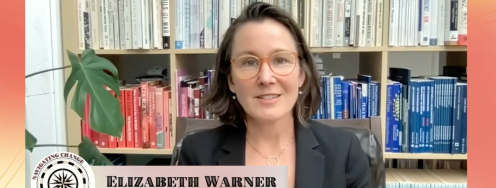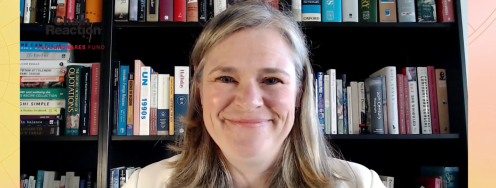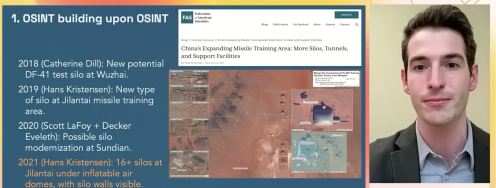On June 5, Barbara Hall, creator of the acclaimed television series, Madam Secretary, spoke at our Chain Reaction 2017 event featuring Secretary of State John Kerry. She spoke about the show's relationship with real world events, and told a remarkable story about a real "Madam Secretary," Madeleine Albright, who was delayed while preparing to make an appearance in an episode of the show. It turns out that former Secretary of State Madeleine Albright was delayed by an historic phone conference about the finalization of the actual Iran nuclear agreement. In the real world, the Iran nuclear agreement stopped a bomb and prevented a new war in the Middle East. Ploughshares Fund played a key role in the success of that agreement, and we continue to defend it against an entrenched opposition. Here are Barbara Hall's remarks, from the video:
Good evening, I'm Barbara Hall and I'm going to be your MC for the evening. I am the creator of the television series Madam Secretary.... When I was approached to create a show about a female secretary of state, I had a mission statement. I wanted to do a show about politics which wouldn't be so polarized and polarizing, because even three years ago it felt that way. Wouldn't it be interesting I thought, fun even, to have a place where everyone could come to a discussion about politics and remain grounded and rational — a tall order, but I wanted to give it a try. I felt a show about foreign policy gave us a great opportunity to do that. Foreign policy stories are often about problem solving rather than hardened political positions, and if I could create a world where people didn't have to defend their positions, perhaps we could get them to pay attention instead to the issues. So we never identified the political party of our administration. Instead, we just asked questions, like what would happen if a nuclear country's government failed? Would the superpowers come together to secure those materials so they wouldn't get in the hands of terrorists? We decided they would and we showed how that would work. Why and how the Pakistanis moved their nuclear weapons around to avoid the US keeping track of them, and what would happen if one ended up across the border in India? We decided the United States would negotiate a peaceful solution, and we showed how that could work. Who makes up the Bulletin of Atomic Scientists and how do they decide when to move up or back, the clock? We did a story where an administration tried to lobby them not to move the clock up because of the bad optics, but after those efforts failed the chief of staff wistfully declared, "you can't lobby scientists, they're in the pocket of big truth." And finally, what would a peace agreement with Iran look like? We wrote that episode almost a year before the signing of the 2015 nuclear agreement, and I'm not saying we gave them the idea, but TV is a powerful medium.
Actually, there is one way in which we did actively participate in the real nuclear agreement. We did an episode of Madam Secretary where Secretary Madeleine Albright appeared as herself, to consult and advise our Secretary of State, Elizabeth McCord. Secretary Albright was happy to be there, in fact she had broached us with this idea. She did a lot of advising us on the show, but when it came time to shoot her scene, we couldn't get her to come out of the dressing room, because she was on the phone. So, you know, with TV, time is money and we were worried about holding up production. A half an hour went by, 45 minutes went by, an hour went by and we were losing daylight, and we were worried about making our schedule, and frankly, we thought she was being kind of a diva. How important could a phone call be? And finally, she showed up on set, nailed all her lines, we had no trouble getting through the scenes, and later we found out what the phone call was. It was a conference call with Secretary John Kerry and all former Secretaries of State to inform them of the finalization of the nuclear agreement and to answer any of their questions regarding it. So we feel we did our part by holding up our production for an hour — and you're welcome.
It is important to be clear that I am a story teller, an entertainer, and not an educator, but if in the course of entertaining people we end up broadening their perspectives, I thing that it's great. They might discover a little more about what the state department does; they might decide that facilitating humanitarian aid, for example, is more than charity, it actually contributes to national security because it improves foreign relations and helps stabilize governments. Or they might consider conversely that climate change makes then less safe from a nuclear threat because it creates drought, famine, displacement of people and can make unstable governments even less stable. They might see how many people it takes to address these issues, so that it becomes clear that a state department that is critically understaffed, and underfunded can be a problem. But the main thing that we in popular culture get to do is give people images — images of people in politics who are driven by the right reasons to do the right thing. The people in this room tonight are the driving force behind those images. I want to thank you for letting me be part of the real work you do. So that when people ask if I really believe there are good forces behind the government and public service like the people on my fictional series, I get to say yes, I know there are, because I have met them. Thank you for proving me right.
Stay abreast of our work by signing up to receive email from Ploughshares Fund.
.@BarbaraHallHQ shares her vision and strategy for the fabulous @MadamSecretary.



